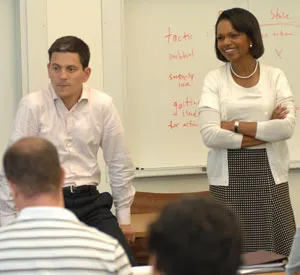On Monday, they debated solutions to the Euro crisis. On Tuesday, devising strategies to bring peace to Afghanistan was the goal. On Wednesday, discussions centered on patent protection of vital medicines versus the developing world’s public health needs. Thursday’s talks examined different approaches to combating terrorism.
And finally, on Friday, the 30 MBAs enrolled in the special Crisis Management on the World Stage class at the Stanford Graduate School of Business focused on the upswell of democracy movements sweeping through Syria and other Arab nations. Their professors were two diplomatic heavyweights — Britain’s David Miliband and Stanford’s Condoleezza Rice.
Miliband, a British Labour Party member, became Britain’s youngest Secretary of State for Foreign and Commonwealth Affairs in three decades when he served from 2007 to 2010. Rice, who was U.S. Secretary of State from 2005 to 2009, is now the Denning Professor in Global Business and the Economy at Stanford GSB and a faculty director of the school’s Center for Global Business and the Economy. The two led students through an examination of international challenges they faced together as their nations’ top diplomats, including issues involving in both international politics and the global economy.

David Miliband, left, and Condoleezza Rice co-teach a class on crisis management.
Miliband, 46, said he wanted the class to stimulate students’ thinking and “make them realize that politics is part of economics, and if you want to be a business leader, you’ve got to understand politics and political risk.”
While he came to the business school to co-teach the course, Miliband said he also enjoyed the opportunity to learn about how the U.S. is wrestling with its own dilemmas. And, he said, discussing complicated issues with Rice definitely kept him on his toes: “You can’t help it if you have a conversation or debate with Condoleezza Rice, you will sharpen your own arguments.”
Shortly before heading back to England, Miliband discussed teaching the course and a variety of topics during a Sept. 22 talk sponsored by the global center. In a conversation with Ken Shotts, professor of political economics at Stanford GSB, Miliband tackled topics ranging from Britain’s pursuit of clean tech, and why there is diminished support for Al-Qaeda in the Muslim world to what sparked him to create a leadership training academy, Movement for Change.
Terrorist network Al-Qaeda has been weakened by efforts from Western governments as well as its own actions, said Miliband. He cited Al-Qaeda’s bombing of a wedding in Jordan in 2005, which killed 52 Jordanian Muslims. Afterwards, “you saw a precipitous fall for support of violent extremism across the Muslim world,” Miliband said. “I think you’ve seen a decay in which Al-Qaeda has been significantly degraded, but also in which millions of Muslims around the world have embraced political Islam, rather than global jihad, as a way to further their interests. From my point of view, the embrace of political Islam is a good thing.”
Even with the bankruptcy of Bay Area solar company Solyndra, Miliband urged MBA students to pursue clean tech, just as Britain continues its ambitious clean tech goals. As Secretary of State for Energy and Climate Change, Miliband pioneered the world’s first legally binding emissions reductions bill. The Climate Change Act of 2008 mandates that the U.K. reduce its carbon emissions by 80% by 2050. The law was supported across the political spectrum, a crucial element of its success. Miliband said: “There’s no point in regulating for two or three years and then another government comes in and turns it over. That’s the importance of cross-party consensus.”
While some business books say that vision is a leader’s most important trait, Miliband disagrees. Passion, he says, is critical. “Unless you have a passion for what you are doing, you will never be able to lead,” he said. “If you’ve got a vision written down, but people don’t see it in your eyes, you won’t lead. If you haven’t got passion, you’ll never be able to inspire.”
As examples, two recent British leaders, former British Prime Minister Tony Blair and his successor, Gordon Brown, both had passion, Miliband explained — Blair for modernizing Britain, and Brown for making a difference in the developing world.
However, superior persuasive skills ultimately made Blair the more successful leader, he said. “Tony was a better synthesizer, and he was a better educator and explainer,” he said. “In a way, Gordon had a tougher task because it’s very hard to follow someone who’s a very good leader.”
Helping develop Britain’s new generation of leadership is the goal of Movement for Change, the community organizing group established by Miliband last year with the goal of mobilizing 10,000 community leaders throughout the country during the next 4 years to drive improvements in education, health, and other areas citizens deem important. “The best solutions involve the government as leader, public and private sector organizations as innovators, and the people mobilized. That’s how you change things,” he said.
The idea for Miliband and Rice to co-teach a business school class came about during a dinner Rice held in the British official’s honor when he was passing through San Francisco earlier this year. The school’s dean, Garth Saloner, another guest, supported the idea.
They jointly decided to give students an introduction to a range of public policy, foreign policy, and diplomacy issues, settling on a curriculum covering terrorism, trade, war, politics, and finance. During each day’s three-hour class, students held a simulated negotiation after hearing an introduction to the topic with insights from Rice and Miliband.
Students wanted up-close stories about the former diplomat’s experiences, Miliband wrote in a blog post, “but they also wanted to understand why the multinational system doesn’t work, whether values can really play a role, how America positions (and mispositions) itself, how the rising powers will engage.”
Susan O’Malley, MBA ‘12, said she took the class because it was a unique opportunity to learn from two people “who shaped history, to hear their stories firsthand and their anecdotes and perspectives.” She called Miliband “a phenomenal communicator in terms of his charisma, passion, and enthusiasm for the issues.”
Another student, Drew DeWalt, MBA ‘12, said the simulated negotiations from the class showed him why it’s so hard for political groups to reach consensus.
“Everybody’s got different interests involved that they want to protect,” said DeWalt. “You realize it really is hard to make progress.”
By Michele Chandler
For media inquiries, visit the Newsroom.



